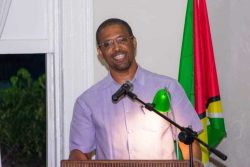The Education Ministry invited seven pre-selected local firms to supply primary and secondary-level textbooks, prompting a surprise bid by the Trinidad and Tobago-based Royards Publishing Company, which holds the copyright for many of the books.
The National Procurement and Tender Administration Board (NPTAB) opened bids for the supply and delivery of textbooks for “Primary and Secondary Textbooks” for the ministry, which called for “All text and workbook (sic) must be done to a similar likeness of the original” and identified “printing presses, scanners, bindery… etc.” as being among the criteria upon which suppliers would be evaluated.
The bids were not opened until some time after 9 last night, following over 12 hours of waiting in the sweltering and congested room of its Main Street office.
By that time, most of the bidders had already left after expressing vocal concerns over the slothfulness of the process. Clifford Narinesingh, who is co-author of some of the texts and a representative of Royards, was among those who had to leave prematurely as he had booked his flight back to Trinidad yesterday afternoon, having anticipated that the opening would be done by the time he was ready to leave.
Narinesingh said his company just wanted to see how the tender process would go before even contemplating any legal option. “I don’t know yet, depends on the directors of the company… It’s an option available for many publishers,” he said.
The ministry had invited seven firms to participate in restrictive tendering for the project, but only five of them placed bids, including two who submitted bids higher than the publisher’s. They were: Giftland OfficeMax ($155,084,264), Pavnik Press ($256,831,211) Metro Office and Computer Supplies ($103,671,162) Sheik Hassan Printery Inc ($78,471,330) and F&H Printing Establishment ($77,382,312). Although Gandhi Variety Store and KRSNA & Balram Printery were invited to bid, they did not.
Royards Publishing Company Limited, of West Laromaine, Trinidad and Tobago, meanwhile, submitted a bid of $103,862,200.
“We are here to have our presence felt… Ours is the original work. Copyright shouldn’t be infringed really. I know there is case in Guyana where to justify it, it is said that it is an impoverished society and you need more books for more children… Colour work and presentation are original and obviously the prices will be higher than the black and white but it’s (piracy) not morally right,” Narinesingh told Stabroek News yesterday.
“The cheaper the books would be made, that’s the human consideration but we [Royards] are throughout the Caribbean and we think that our original books should be seen and used throughout the Caribbean if it merits that,” he added.
One of the bidders, when asked why their bid should be accepted over the legitimate publisher, said the company did not know the copyright owners were bidding and opined that since it was a government project and would reflect on the country, then maybe it should be given to Trinidadian company.
“When we print and sell to stores is to meet the average person who cannot afford original texts. It is hard on families to [buy] original books, more so if it is a poor family. So we have to help them,” the bidder said.
“We didn’t know that they [Royards] would be bidding too… Why then did the ministry invite us? Government can pay for original. The sales clerk or the public servant can’t and we all know that,” the bidder added.
Copied texts are sold by a number of prominent urban retail businesses, including Giftland OfficeMax and Gandhi Variety Store. Legitimate importers and overseas publishers have for years been battling the multi-million dollar pirating of textbooks, which allows for copies of texts to be sold at considerably lower prices. Protests to the authorities regarding the underlying infringement of intellectual property and copyright legislation have, however, been met with evasiveness.
Austin’s Bookstore, the city’s leading bookseller, had told Stabroek Business up to 2010 that it had to cut the importation of textbooks by up to 70% as a result of the competition from pirated copies. Lloyd Austin, the store’s proprietor, told this newspaper then that his store was down to importing “a few dozen copies” of texts from several reputable publishers as against “a few hundred” in previous years. He also said he had to slash importation of books published by Oxford, Nelson-Thorne, Heinemann and Longman as well as two regional publishing houses, Royards and Caribbean Education Publishers, which were key publishers of books used in the local school curriculum.
At that time, Austin noted that the Ministry of Education may at least have some knowledge of the illegal printing of textbooks and then education minister Shaik Baksh reportedly agreed to find out about the claim that his ministry might be in league with the pirates. A source had told this newspaper then that some schools had already begun receiving bulk copies of copied texts from the ministry’s Book Distribution Unit for distribution in schools.
Stabroek Business had been told that a local attorney had been retained to pursue legal action against entities printing and marketing the illegal texts, but evidence against the perpetrators had been difficult to come by.
In a letter to this newspaper, printed in today’s issue, Austin again deplored that the practice of illegally printing textbooks seemed set to continue








